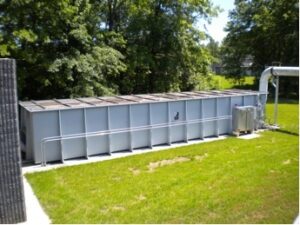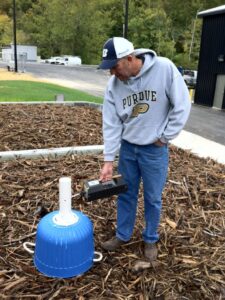The Science Behind Biofilters for Odor Control: Why They Work
 Effective odor management is a critical need for many industrial and municipal facilities. Odors from wastewater treatment plants, food processing facilities, and solid waste sites can cause compliance challenges and negatively impact surrounding communities. Managing these odors requires a thoughtful, science-based approach.
Effective odor management is a critical need for many industrial and municipal facilities. Odors from wastewater treatment plants, food processing facilities, and solid waste sites can cause compliance challenges and negatively impact surrounding communities. Managing these odors requires a thoughtful, science-based approach.
Biofilters are an effective and environmentally friendly solution. These systems use natural processes to break down odorous compounds, which makes them a sustainable option for facilities seeking long-term odor control. At Webster Environmental Associates (WEA), we specialize in creating odor control technologies, including the design and implementation of biofilters suited to each client’s needs.
The Biological Process of Biofiltration
Biofilters work by using microorganisms to break down pollutants in contaminated air. These microorganisms live on a specialized media bed, such as organic materials like wood chips or synthetic options. As odorous air passes through the media, the microorganisms digest odor-causing compounds like hydrogen sulfide and volatile organic compounds (VOCs). This process converts harmful pollutants into harmless byproducts, such as water, carbon dioxide, and sulfate.
For biofilters to function effectively, certain conditions must be maintained. Proper moisture levels are essential because microorganisms need water to stay active. pH levels should also remain within a specific range to support microbial health. Additionally, temperature must be managed to ensure the microbes thrive and consistently break down pollutants. WEA designs biofilters with these factors in mind, and we work hard to maintain optimal performance for each facility.
Applications of Biofilters in Real-World Settings
Biofilters are a versatile odor control option, which makes them suitable for various industries. Wastewater treatment plants frequently use biofilters to manage odors from processes like sludge handling and aeration. These facilities often generate steady odor loads, which biofilters can effectively handle.
Solid waste facilities also benefit from biofilters. Composting operations, for example, produce organic emissions that can lead to strong odors. Biofilters help neutralize these emissions while supporting sustainable waste management practices.
In food processing and rendering industries, biofilters control odors generated by organic materials and byproducts. These facilities often face regulatory pressures to minimize emissions, and biofilters provide a reliable way to meet these requirements. WEA’s expertise in designing biofilter systems ensures they perform well in a range of operational environments.
Why Biofilters Are a Sustainable Choice
Biofilters are one of the most environmentally friendly odor control technologies available. Unlike chemical scrubbers or activated carbon systems, biofilters use natural processes to neutralize odors. This approach eliminates the need for additional chemicals and reduces environmental impact.
Biofilters also have low energy requirements, so they are cost-effective to operate over the long term. Their ability to break down pollutants without generating harmful byproducts further improves sustainability. For facilities aiming to reduce their carbon footprint, biofilters are an excellent choice.
Compared to chemical scrubbers, biofilters are particularly advantageous for facilities with steady, predictable odor loads. While scrubbers are effective in certain situations, they require chemical storage, handling, and disposal, which can increase costs and environmental risks. Activated carbon systems, on the other hand, are better suited for low-concentration odor streams and may require frequent media replacement. Biofilters offer a balance of efficiency, sustainability, and long-term reliability.
Partnering with WEA for Customized Biofilter Systems
 At WEA, we understand that no two facilities are the same. That’s why we take a case-by-case approach to biofilter design and implementation. Our team begins by conducting a thorough site assessment to identify odor sources and evaluate the facility’s operational needs. Using this information, we design biofilter systems that address specific challenges while meeting regulatory and operational requirements.
At WEA, we understand that no two facilities are the same. That’s why we take a case-by-case approach to biofilter design and implementation. Our team begins by conducting a thorough site assessment to identify odor sources and evaluate the facility’s operational needs. Using this information, we design biofilter systems that address specific challenges while meeting regulatory and operational requirements.
WEA supports facilities throughout the entire process, from initial installation to ongoing maintenance. We provide training to help staff manage the system effectively and ensure long-term performance. Regular monitoring and adjustments are also part of our services, allowing us to optimize the biofilter as conditions change over time.
With decades of experience in odor control technology, WEA has a proven track record of delivering results. Our commitment to data-driven solutions and client satisfaction sets us apart as a trusted partner in odor management.
Explore Sustainable Odor Control with WEA
Biofilters offer a powerful and sustainable way to manage odors in industrial and municipal facilities. By leveraging natural processes, these systems deliver effective odor control while minimizing environmental impact. At WEA, we help facilities design, install, and maintain biofilters that meet their unique needs. Contact us today to learn how we can help your facility achieve reliable and cost-effective odor control.
